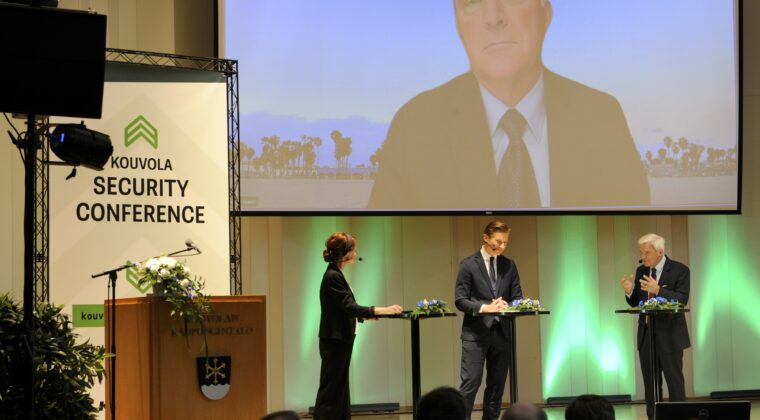
Diverse dialogue was a vital part of the DNA of the Kouvola Security Conference 2023. Here are the highlights from
Minister of Defence Antti Häkkänen, Nato General (retired) Curtis Scaparrotti and Norway’s Ambassador to Finland Wegger Christian Strømmen discussed Nordic Defence cooperation in Nato. The trio agreed that Nato has no use for blocs within the alliance, but certain “Northern dimension” is sure to emerge with Finland and Sweden (eventually) joining Nato.
Minister Häkkänen noted that Finland is already reaping the benefits of full membership, as there are “no limits” to planning and exchanging information. “The Nordic defence concept is coming, and Finland has a role of a frontline country in this concept,” Häkkänen said, remarking that the future Russian situation doesn’t look very rosy post-Putin, either.
Russia’s counter move
General Scaparrotti pointed out that Russia has announced an intent to rebuild its military capability near Finland, as a response to Finland’s Nato membership. “Finland and Sweden joining Nato pose a big strategic problem for Russia,” he said.
The panelists addressed also various military capabilities in the Nordics and beyond. One obvious asset is air power: in the coming years, Europe will boast as many as 600 F-35 fighter jets.
Minister Häkkänen assessed that Finland wants to be a trusted, realistic member of Nato. This includes taking part in Nato’s long-range operations beyond Finnish borders.
“You got to give security to get security,” Häkkänen summed up.
Eye on the endgame
Lessons learned from the war in Ukraine were discussed by Deputy Head of Mission Maksym Kravchuk from Embassy of Ukraine in Finland, former Ambassador of Finland to Russia Hannu Himanen, Professor Kari Liuhto from University of Turku and Lieutenant Colonel Simo Pesu from National Defence University.
Professor Liuhto assessed that what we have seen so far in Russia is “a crack in the dam” that will most likely lead to dramatic consequences.
“Putin’s end will surprise us, and it will happen faster than we think,” he said. Still, Liuhto doesn’t believe that we will see civil war or total collapse of Russia – but we won’t see democracy, either.
Hannu Himanen pointed out that, over time, Finns have learned a valuable lesson: Russia still holds the mindset of an empire; it has never adopted the mentality of a nation state.
Maksym Kravchuk added that the current war in his home country traces its bloody origins to 2008 and the Russian attack on Georgia. Coping with an enemy that plays the long game is difficult: Kravchuk called the challenge ahead “enormous”, but by standing united, the Russia aggression can be overcome.
Who controls the Baltic Sea?
Panel on the security challenges of the Baltic Sea was hesitant to declare the Baltic Sea “Mare Nostrum” for Nato, but the panelists did acknowledge that it’s mostly Nato that calls the shots on the Baltic.
Colonel Pekka Turunen from National Defence University commented that as the Baltic Sea is probably “the most important pond” for Russia right after the Black Sea, Russian involvement on the Baltic Sea is likely to intensify in the future. “Don’t take the safety of the Baltic Sea for granted,” cautioned Iro Särkkä from the Finnish Institute of International Affairs.
Deadly truth
The panel on media literacy, information influencing and societal resilience was especially poignant as Ekaterina Glikman, Deputy Editor-in-Chief of Novaya Gazeta Europe, told the audience about the persecution and hardships suffered by the Russian newspaper. Glikman has lost six colleagues as Russia’s attempts to root out free press become more brazen over time. “The biggest strength of propaganda is not lies – it’s the power to make you disappear completely,” she said.
Other panels of the day touched on how Finnish defence industry can take advantage of Finland’s Nato membership, as well as the future of security in Europe from the perspective of political youth organizations.
